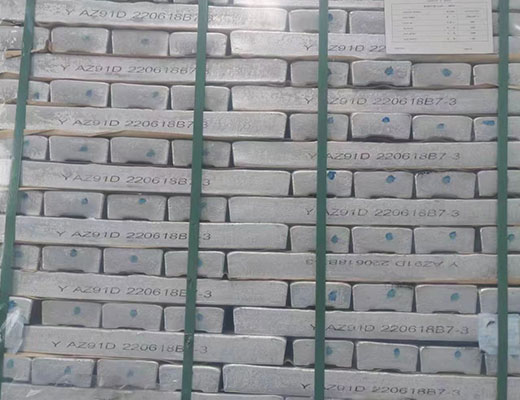AZ91D MAGNESIUM ALLOY

產品說明
YiRui Metal supply high-quality magnesium alloy AZ91D series with weights of 6KG and 12KG. Other specifications need to be customized in advance.
Magnesium alloy az91d is a high-strength, lightweight material that is commonly used in a wide range of applications. It is composed of magnesium, aluminum, and zinc, and is known for its excellent corrosion resistance, good machinability, and high thermal conductivity.
Magnesium az91d is particularly popular in the automotive industry, where it is used to make parts such as wheels, steering wheels, and gearbox casings. It is also used in the manufacture of consumer electronics, aerospace components, and medical equipment.
MAGNESIUM ALLOY mg az91d MECHANICAL PROPERTIES
AZ91D is a magnesium alloy that is commonly used in various applications due to its desirable mechanical properties. Here are some of its mechanical properties:
Tensile Strength: magnesium alloy AZ91D has a tensile strength of 230 MPa (MegaPascals) in the as-cast condition, and it can be improved up to 270 MPa through appropriate heat treatment.
Yield Strength: The yield strength of magnesium alloy AZ91D is 140 MPa in the as-cast condition and can be improved up to 200 MPa with heat treatment.
Elastic Modulus: The elastic modulus of magnesium AZ91D is around 45 GPa (GigaPascals), which is lower than that of aluminum alloys and steel.
Ductility: AZ91D has good ductility, which means it can be easily formed into complex shapes. Its elongation at break is typically around 3-4%.
Fatigue Strength: The fatigue strength of magnesium alloy AZ91D is moderate compared to other engineering materials, and it decreases with increasing cyclic stress.
Overall, AZ91D is a lightweight material with good strength and ductility, making it an attractive choice for applications where weight reduction is important. However, it should be noted that magnesium alloys are prone to corrosion, so appropriate measures need to be taken to prevent corrosion in service.
AZ91D MAGNESIUM ALLOY PHYSICAL PROPERTIES
Density: The density of magnesium AZ91D is around 1.78 g/cm³, which is about one-third the density of steel and two-thirds the density of aluminum.
Melting Point: The melting point of magnesium alloy AZ91D is approximately 570°C (1060°F).
Thermal Conductivity: The thermal conductivity of magnesium alloy AZ91D is lower than that of aluminum alloys and steel, but higher than most plastics. It is around 75 W/mK (Watts per meter Kelvin) at room temperature.
Coefficient of Thermal Expansion: The coefficient of thermal expansion of magnesium alloy AZ91D is relatively high, around 26 x 10^-6/K (per Kelvin) in the temperature range of 20-100°C.
Electrical Conductivity: The electrical conductivity of magnesium AZ91D is relatively low, around 15% that of copper.
Magnetic Properties: magnesium AZ91D is not magnetic, which makes it suitable for applications where magnetic interference needs to be avoided.
MAGNESIUM ALLOY AZ91D APPLICATION
AZ91D magnesium alloy is a commonly used magnesium alloy in various industrial applications. It is a cast alloy, which means it is formed by pouring molten metal into a mold and allowing it to solidify.
Magnesium in automotive industry: AZ91D magnesium alloy is commonly used in the automotive industry for components such as engine blocks, transmission cases, and wheels. Its lightweight properties make it an attractive material for reducing the weight of vehicles, which can improve fuel efficiency and reduce emissions.
Magnesium alloy in aircraft: The alloy is also used in the aerospace industry for applications such as aircraft engine components, and in the electronics industry for housings and frames of devices like laptops and smartphones.
Other applications of AZ91D magnesium alloy include sporting goods such as golf club heads and bicycle frames, as well as medical implants and orthopedic devices due to its biocompatibility and strength-to-weight ratio.

